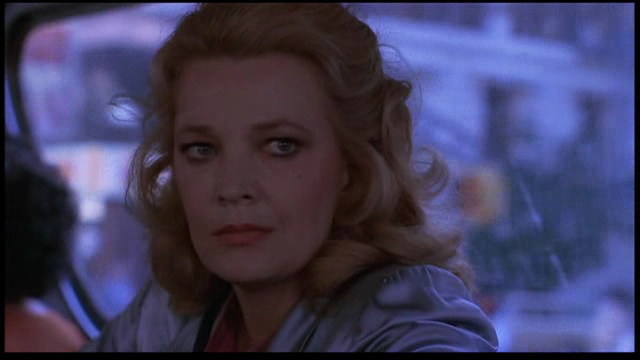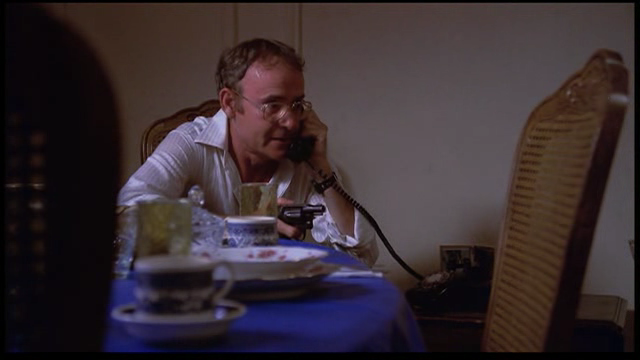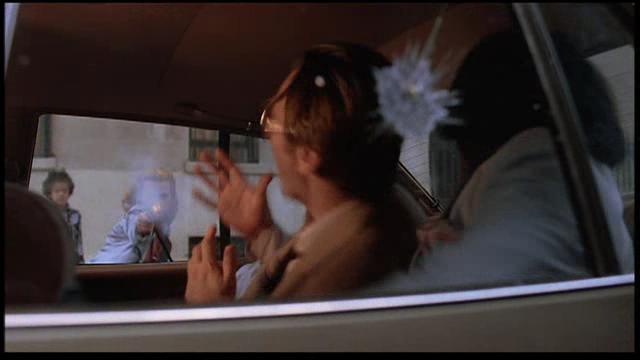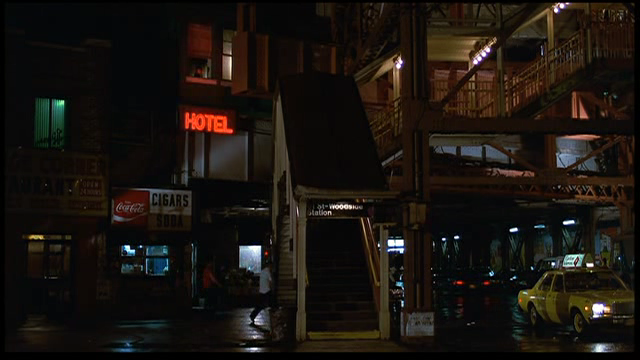|
Genres, Themes, Actors, and Directors:
- Cat-and-Mouse
- Gangsters
- Gena Rowlands Films
- John Cassavetes Films
- Lawrence Tierney Films
- Strong Females
Response to Peary’s Review:
As Peary notes, this “unusual, tough action film” represents a “change of pace for director John Cassavetes and his actress wife, Gena Rowlands”, given that it “replaces introspective dialogue with flying bullets”. It’s primarily notable for the truly “dynamic performance” given by Rowlands, who justifiably earned an Oscar nomination; her character — a “retired former gun moll” who “proves smarter, more resourceful than the killers who chase her and, when necessary, as brutal as they are” — is indeed “unique to cinema”. As the film begins, Cassavetes sets up an almost unbearably tense scenario (reminiscent of the Godfather films), as Buck Henry’s wife (Julie Carmen) is followed back to her apartment, and we soon realize that she and her young family are going to be murdered in cold blood by vengeful mobsters. When Carmen’s flinty, child-hating neighbor (Rowlands as “Gloria Swenson”) is tasked with hiding Carmen’s young son (Adames) — and thus saving him from being killed — we’re literally on the edge of our seats, wondering what will become of this unlikely duo.
Indeed, for the first hour or so, it’s quite compelling to watch Rowlands and Adames make their way across the “gritty”, “sordid New York and New Jersey locations”, as “Gloria stands her ground and guns down some mobsters in a car” (a truly shocking sequence), and she and Phil (Adames) establish their tenuous relationship with one another (I love how Rowlands literally swats Adames off the bed in irritation when he starts asking her too many questions). But as whiny Adames is given more and more screentime (and dialogue), things quickly go downhill; as Peary notes, Adames’ “little boy [who] is supposed to constantly act like a big man will really test your nerves”. (It’s interesting to contemplate whether a different, more skilled child actor — i.e., a Jodie Foster — could have actually pulled off this very challenging role; I’m not certain.)
At any rate, I disagree with Peary that “Buck Henry, in the small part of the boy’s father, is also miscast” — his nebbishy character actually seems perfectly suited as an accountant who stupidly puts his own and his family’s lives at risk. And while Peary calls this film “underrated”, I can’t say I agree — though I’ll concede it’s must-see viewing simply for Rowlands’ iconic performance.
Note: Adames co-earned a Razzie — along with Laurence Olivier! — that year for his performance in this film, and never acted again.
Redeeming Qualities and Moments:
- Gena Rowlands as Gloria — nominated for an Alternate Oscar by Peary

- The truly nerve-wracking opening assassination sequence

- Creative direction by Cassavetes

- Nice use of authentic locales

Must See?
Yes — simply for Rowlands’ Oscar-nominated performance.
Categories
- Noteworthy Performance(s)
- Oscar Winner or Nominee
Links:
|
One thought on “Gloria (1980)”
An enthusiastic must-see which holds up well on repeat viewings.
I first saw this on release in New York City with my best bud Tom. I had just moved there a few years before, and it was an exciting time to be living in NYC (so unlike now). Tom and I sat in the balcony of The Elgin Theater and when ‘Gloria’ began…it was magic: DP Fred Schuler’s “in love with New York” panorama shots, mixed with Bill Conti’s remarkably lush score just sucked you right in – and it all took off from there, from start to finish!
Cassavetes’ (arguably) best film also turned out to be his most successful one at the box office – I was glad to see that ‘Gloria’ was a big fat hit, cause it deserved it. This is simply a dynamite movie – and Cassavetes certainly produced a valentine of a role for his wife to play. Once you’ve met Rowlands as Gloria, you don’t forget her; she’s *that* good! She picks you up (by the lapels), takes you with her, and you run with her all the way!…It was a pleasure seeing her on this revisit, to say the least.
But I could also say the most about the entire film itself. Coming as it does on the heels of ‘The Godfather’ pics, ‘Gloria’ ups the ante by giving us that world through the eyes of a woman instead. Smart (financial) move. But this is hardly a franchise rip-off – it’s a completely original idea as a stand-alone flick. As a mob movie, Cassavetes takes the opportunity to show his apparent love of cinema history (i.e., Cagney and Bogart pictures, I’m guessing) and places Rowlands front-and-center in the kind of protagonist role traditionally held by a guy. It’s a strange twist on noir – since Gloria does not make a choice which decides her fate; that choice is thrust upon her. The sudden relationship she has with Adames’ Phil is wobbly from the get-go and often stays that way. It’s awkward and uncomfortable. It’s raw, painful and refreshingly human. They both say things to each other that they don’t mean, only to realize how dumb they’re being when they need each other if they’re to gain control of their lives.
Control is gained through a strategically written series of tense developments. Gloria and Phil (and the audience) are given precious little time to catch their breath. My favorite of these developments is probably the terrific subway sequence (and what leads up to it). Perhaps this is what gets me most because, when it reaches its climax, Gloria is given one of her best lines – as she yells to the mob “punk” she detests, “Ya let a woman beat ya!”
Which brings me to the issue of Cassavetes’ sense of humor (which is laced throughout the bulk of his films, in general). As a director, he knows that ‘Gloria’ is a tough-as-nails drama, but as a writer he also knows that it’s ok to have a little fun along the way in some of the dialogue. Some of the lines are (I think) quite intentionally funny, and sometimes at odd times for humor: in the unsettling opening (for example), Gloria tells Phil’s distraught mom that she doesn’t want to take on the responsibility of a kid – she doesn’t like kids: “Especially your kids.” A very funny line at a very unfunny moment. (By the way, Carmen is quite good too in this sequence – as is the huge surprise of what Henry pulls off.)
Which brings me to Adames. He gets his own share of rich responses: “I don’t mind. I don’t mind a lot of things. But this is a little gruesome.”; “You’re a nice girl, Gloria, but you’re not for me.”, etc. Cassavetes (wonderfully) has some of the strangest things come out of this kid’s mouth. And they’re priceless. (A common complaint is that Adames is annoying in this film because, as they say, he can’t act. I don’t agree with that. He doesn’t *have* to act – he’s a 6-year-old Puerto Rican kid. That’s all he has to be – it’s natural, he has plenty of believable moods, and I buy it.)
Overall, I’m very fond of this film. In a way, my favorite Cassavetes film might still be ‘The Killing of a Chinese Bookie’ – but ‘Gloria’ may run a very close second. I’m glad Cassavetes had a roaring success with it. It is a commendable job well done!